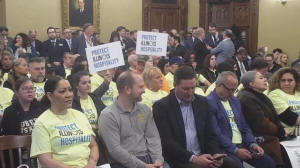|
Under the current system, businesses pay a portion of the tipped
employee’s hourly minimum wage, with the rest being made up by
tips to equal at least the full state-mandated minimum wage. The
base wage for tipped employees in Illinois is currently $8.40
per hour, and minimum wage is $14 per hour. If employees do not
make at least $14 per hour with combined base wage and tips,
businesses are required by law to pay the difference to ensure
that every tipped worker makes at least minimum wage.
The group One Fair Wage said if passed, House Bill 5345 could
boost pay for nearly 200,000 Illinoisans who earn a minimum wage
that is 40% less than other workers. State Rep. Lisa Hernandez,
D-Cicero, sponsors HB5345. The measure passed out of committee
Wednesday despite bipartisan opposition. Hernandez told the
House Labor and Commerce Committee she won't call the bill for a
final vote on the House floor without addressing concerns.
Critics say the change would alter the way restaurants and
similar businesses pay their employees, leading to less
take-home pay for workers and increased costs for businesses.
“The notion that tipped employees make less than minimum wage is
simply not true,” said Sam Toia, president of the Illinois
Restaurant Association.
Toia said the median tipped restaurant worker in Illinois
currently earns over $28 per hour.
The group Protect Illinois Restaurants reported a recent survey
showed that 87% of tipped restaurant employees said the current
tipping system works for them and should not be changed. If
tipped wages are eliminated, 86% of employees believe that they
will earn less.
“If this legislation becomes law, here’s what we can expect,”
said Toia. “Layoffs for servers, bartenders, bussers and
runners, fewer hours for servers and higher costs at the table
for consumers.”
Employment Policies Institute reports eliminating the tip credit
in Illinois would eliminate an estimated 7,730 jobs and lead to
$20.7 million of lost earnings for tipped employees.
“We should be doing everything we can to lift them up, not
imposing another unjustifiable burden when so many are already
grappling with significant economic challenges,” said State Rep.
Curtis Tarver, D-Chicago.

|
|




